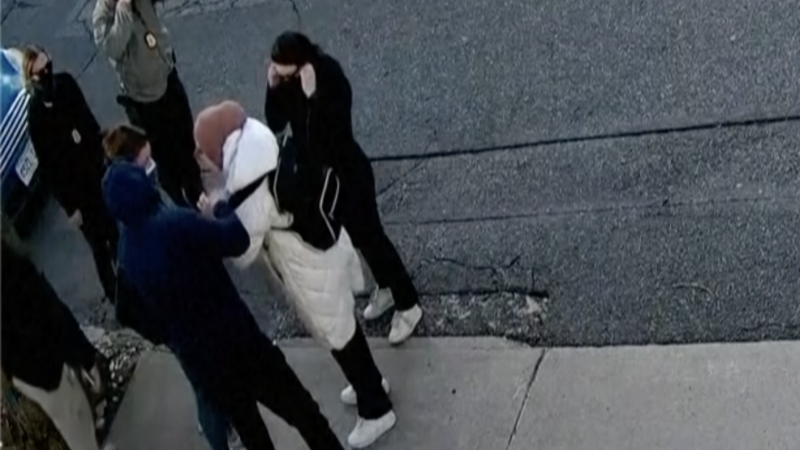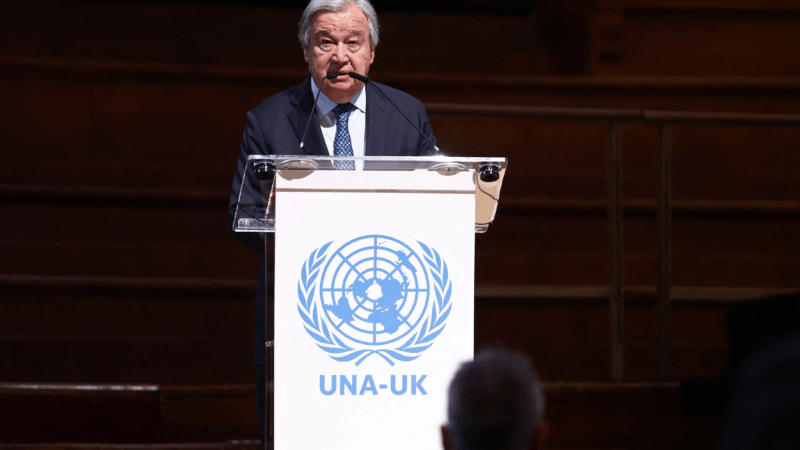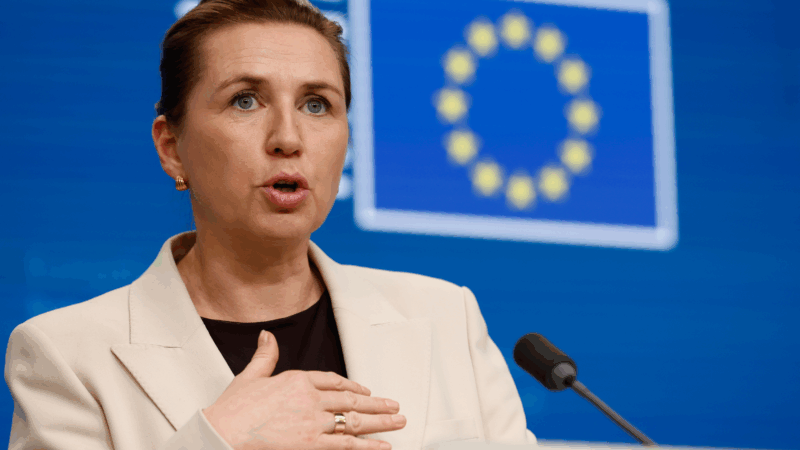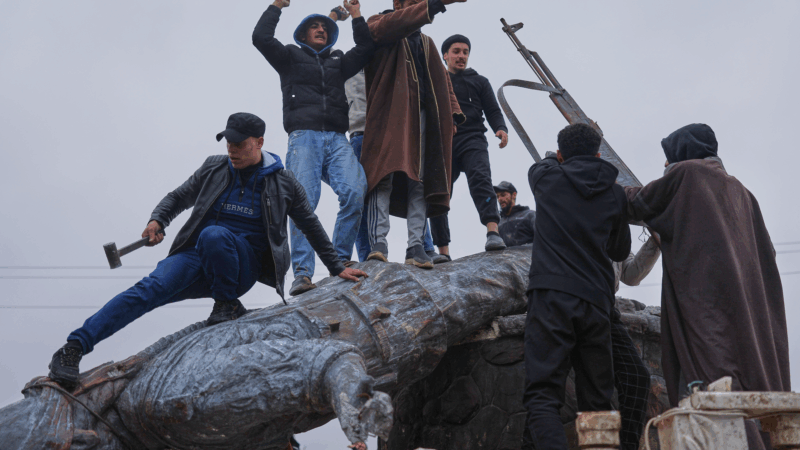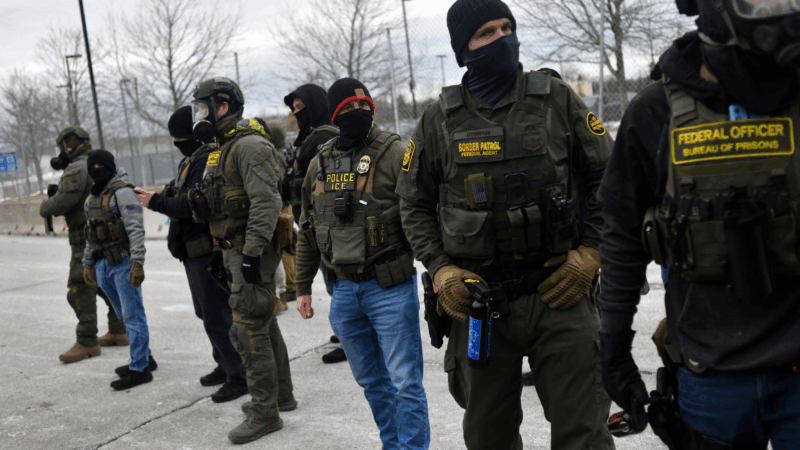Masked officers in Tufts student arrest raise fears among immigrants and bystanders
When Turkish doctoral student Rumeysa Ozturk was arrested in Somerville, Mass. and detained on Tuesday, there was an immediate outcry over what supporters see as government retaliation for her political views of the war in Gaza.
But many people also focused on what online videos of her arrest revealed: law enforcement agents wearing masks.
In the videos that captured the moment, Ozturk, 30, is seen being surrounded by three men and three women wearing street clothes. Most of them are also masked. One man’s face is visible at first, then when he looks up toward the camera, he pulls a neck gaiter up over his nose like his colleagues.
The person taking one of the videos can be heard shouting to them, “You want to take those masks off? Is this a kidnapping? Can I see some faces here? How do I know this is the police?”
The man asked NPR to withhold his name for fear of repercussions for criticizing ICE. He says he assumed he was watching a government operation, but he still regarded it as the moral equivalent of a kidnapping.
“It’s clear that you cover your face when you’re doing immoral actions,” he says.
Public concern over masked law enforcement has been growing in the years since the pandemic, which first opened up a medical exception to department rules requiring officers to keep their faces visible. Even as Covid-19 waned, some officers kept the gaiters as an optional face covering, especially when confronted by members of the public recording video.
Special units such as tactical teams and undercover investigators are also often allowed to use masks in certain situations.

For federal law enforcement, there appears to be more freedom to wear masks. Immigration and Customs Enforcement didn’t respond to NPR’s question about mask rules, but the publicly-available versions of ICE policies do not appear to ban masks.
Recently-retired ICE agents tell NPR that they can’t recall being told not to wear masks, and that the decision to wear them is usually left to the discretion of an operation commander.
Since the start of President Trump’s second term and the push for mass deportations, ICE has also borrowed agents and officers from other federal agencies, such as the Drug Enforcement Administration and Homeland Security Investigations. Federal agents who usually do more sensitive or undercover work may have professional reasons to conceal their faces while doing these high-profile immigration arrests.
But when caught on video, the masks strike many people as ominous. A written statement by Mahsa Khanbabai, a lawyer for Ozturk, stresses that the arresting agents were masked, and that “[n]othing in this video indicates that these are law enforcement agents and from which agency. This video should shake everyone to their core.”
Some agents in the video do appear to have badges around their necks, but the car they lead Ozturk toward is unmarked.
Transcript:
AILSA CHANG, HOST:
Earlier this week, ICE arrested a Turkish student studying at Tufts University on a valid visa. The U.S. government accuses Rumeysa Ozturk of supporting Hamas. Her lawyers say her detention is an attempt to suppress free speech, but what has struck many people is that the officers who arrested her were wearing masks. We asked NPR law enforcement correspondent Martin Kaste to sort through this, and he joins us now. Hi, Martin.
MARTIN KASTE, BYLINE: Hi, Ailsa.
CHANG: OK, this arrest – it was caught on video, and for those people who have not seen this video, can you just describe what it shows?
KASTE: Yeah. Well, there are two videos out there of her arrest. The one I’m going to talk about here was obtained by a freelance reporter named Daniel Boguslaw from the person who filmed it in a house nearby. It shows Miss Ozturk on a sidewalk in Somerville, Massachusetts, as she’s surrounded by three men and three women in street clothes. And you can see that most of them have badges. Most of them are also – but most of them are also masked. And you can listen to the reaction here from the man who’s filming them from his porch.
(SOUNDBITE OF ARCHIVED RECORDING)
UNIDENTIFIED PERSON: Is this a kidnapping? Can I see some faces here? How do I know this is the police?
KASTE: In that video, you can also see that their masks are actually those neck gaiters that people sometimes wear around their necks and pull over their faces in cold weather. One officer kind of looks up at the camera, sees it and pulls his gaiter up over his nose.
CHANG: Wait. And the man who shot this video – did he really think it was a kidnapping?
KASTE: I asked him that. We’re not using his name here because he’s worried about repercussions for criticizing ICE. And he says he assumed it was a government operation, but he says on a moral level, he also considers it to have been a kidnapping because why else would police hide their faces? And that’s a sentiment that’s been shared by a lot of people who’ve seen this video.
CHANG: Well, Martin, why would these officers hide their faces? Like, what are the rules for law enforcement when it comes to wearing masks?
KASTE: Local police generally aren’t supposed to wear anything that’s not part of their official uniforms, but there are exceptions for tactical teams or cold weather. Those neck gaiters especially occupy kind of a gray zone because during the pandemic, a lot of officers wore them instead of medical masks. But generally speaking, American cops are supposed to have their badges and their faces visible.
CHANG: OK, cops, but this was apparently an ICE operation…
KASTE: Right.
CHANG: …Right? So what are the rules for immigration officers?
KASTE: Well, we asked ICE, and they wouldn’t answer questions about this. We couldn’t find any mask rules in publicly available ICE handbooks, and retired ICE agents tell me that they don’t recall ever being told they couldn’t wear masks.
But it should also be noted here that these might not have been full-time ICE agents. Lately, ICE has been borrowing people from other federal agencies such as the U.S. Marshals and the Drug Enforcement Administration. And I’m told some of these immigration arrests are being done by people who usually do other kinds of investigations or even undercover work, and they would have a professional interest in not having their faces on the internet.
CHANG: Well, in your reporting on police, do you get a sense that police attitudes, law enforcement attitudes, towards masks are shifting?
KASTE: I think they are in some contradictory ways, maybe. Police chiefs have been fretting about how pandemic masks made it easier for criminals to hide their faces. Historically, many states have restricted masks in public, in part because of the legacy of groups such as the Ku Klux Klan. With the pandemic behind us, though, you do get some sense that there’s a return or a desire to go back to some kind of restrictions on masks. But police also share some of the fears of campus protesters who masked up last year. But of course, when a police officer puts on a mask, it has a very different effect.
CHANG: Absolutely. That is NPR’s Martin Kaste. Thank you, Martin.
KASTE: You’re welcome.
(SOUNDBITE OF MUSIC)
High-speed trains collide after one derails in southern Spain, killing at least 21
The crash happened in Spain's Andalusia province. Officials fear the death toll may rise.
United Nations leaders bemoan global turmoil as the General Assembly turns 80
On Saturday, the UNGA celebrated its 80th birthday in London. Speakers including U.N. Secretary-General António Guterres addressed global uncertainty during the second term of President Trump.
Parts of Florida receive rare snowfall as freezing temperatures linger
Snow has fallen in Florida for the second year in a row.
European leaders warn Trump’s Greenland tariffs threaten ‘dangerous downward spiral’
In a joint statement, leaders of eight countries said they stand in "full solidarity" with Denmark and Greenland. Denmark's Prime Minister Mette Frederiksen added: "Europe will not be blackmailed."
Syrian government announces a ceasefire with the Kurdish-led Syrian Democratic Forces
Syria's new leaders, since toppling Bashar Assad in December 2024, have struggled to assert their full authority over the war-torn country.
U.S. military troops on standby for possible deployment to Minnesota
The move comes after President Trump again threatened to invoke the Insurrection Act to control ongoing protests over the immigration enforcement surge in Minneapolis.

